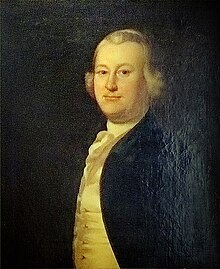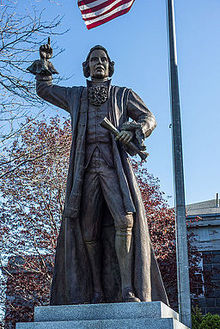James Otis Jr.

James Otis Jr. (February 5, 1725 – May 23, 1783) was a lawyer in colonial Massachusetts, a member of the Massachusetts provincial assembly, and an early advocate of the political views that led to the American Revolution.
Quotes[edit]
- ALL PRECEDENTS ARE UNDER THE CONTROUL OF THE PRINCIPLES OF THE LAW … No Acts of Parliament can establish such a writ [writ of assistance enabling British search of homes for no reason]: … it would be void, "AN ACT AGAINST THE CONSTITUTION IS VOID." Vid. Viner. But … special writs may be granted on oath and probable suspicion.
- Massachusetts Spy (April 29, 1773)(Principle of judicial review. In addition, much like the prohibition of unreasonable searches and seizures under the Fourth Amendment of the US Constitution).
- If we are not represented, we are slaves.
- Report on the Sugar Act (13 June 1764).
- England may as well dam up the waters of the Nile, with bulrushes, as to fetter the step of freedom, more proud and firm in this youthful land, than where she treads the sequestered glens of Scotland, or couches herself among the magnificent mountains of Switzerland. Arbitrary principles, like those, against which we now contend, have cost one king of England his life, another, his crown — and they may yet cost a third his most flourishing colonies.
We are two millions — one fifth fighting men. We are bold and vigorous, — and we call no man master. To the nation, from whom we are proud to derive our origin, we ever were, and we ever will be, ready to yield unforced assistance; but it must not, and it never can be extorted.
Some have sneeringly asked, "Are the Americans too poor to pay a few pounds on stamped paper? No! America, thanks to God and herself, is rich. But the right to take ten pounds, implies the right to take a thousand; and what must be the wealth, that avarice, aided by power, cannot exhaust? True the spectre is now small; but the shadow he casts before him, is huge enough to darken all this fair land.- As quoted in The Class Book of American Literature (1826) edited by John Frost, Lesson XLIX : Specimen of the Eloquence of James Otis i extracted from "The Rebels."
Argument Against the Writs of Assistance (1761)[edit]

Partial Source: James Otis (February 24, 1761): Against Writs of Assistance. Published by the Constitution Society. Archived from the original on January 16, 2024.
- The only principles of public conduct that are worthy of a gentleman or a man are to sacrifice estate, ease, health, and applause, and even life, to the sacred calls of his country. These manly sentiments, in private life, make good citizens; in public life, the patriot and the hero. I do not say that, when brought to the test, I shall be invincible. I pray God I may never be brought to the melancholy trial; but, if ever I should, it will then be known how far I can reduce to practice principles which I know to be founded in truth. In the meantime I will proceed to the subject of this writ.
- Now, one of the most essential branches of English liberty is the freedom of one's house. A man's house is his castle; and whilst he is quiet, he is as well guarded as a prince in his castle. This writ, if it should be declared legal, would totally annihilate this privilege. Custom-house officers may enter our houses when they please; we are commanded to permit their entry. Their menial servants may enter, may break locks, bars, and everything in their way; and whether they break through malice or revenge, no man, no court can inquire. Bare suspicion without oath is sufficient.
- But to show another absurdity in this writ: if it should be established, I insist upon it every person, by the 14th Charles Second, has this power as well as the custom-house officers. The words are: "It shall be lawful for any person or persons authorized," etc. What a scene does this open! Every man prompted by revenge, ill-humor, or wantonness to inspect the inside of his neighbor's house, may get a Writ of Assistance. Others will ask it from self-defence; one arbitrary exertion will provoke another, until society be involved in tumult and in blood.
The Rights of British Colonists Asserted (republicanism I t's not he good of the whole. Salus populi suprema lex esto is the law of nature, and part of that grand charter given the human race (though too many of them are afraid to assert it) by the only monarch in the universe who has a clear and indisputable right to absolute power; because he is the only One who is omniscient as well as omnipotent.
- Kingcraft and priestcraft have fell out so often, that 'tis a wonder this grand and ancient alliance is not broken off forever. Happy for mankind will it be when such a separation shall take place.
- The end of the government being the good of mankind points out its great duties: it is above all things to provide for the security, the quiet, the happy enjoyment of life, liberty, and property.
- If life, liberty, and property could be enjoyed in as great perfection in solitude as in society, there would be no need of government.
- … [Slave] trade … is the most shocking violation of the law of nature, has a direct tendency to diminish … liberty, and makes every dealer in it a tyrant, from the director of an African company to the petty chapman [peddler]…. The colonists are by the law of nature free-born, as indeed all men are, white or black...It is a clear truth, that those who every day barter away other men's liberty will soon care little for their own.
- Taxes are not to be laid on the people but by their consent in person or by deputation.
Misattributed[edit]
- Taxation without representation is tyranny.
- Attributed as a statement by Otis in court in 1761, but no record of the remark has been found prior to the 16th century
External links[edit]
 Encyclopedic article on James Otis Jr. on Wikipedia
Encyclopedic article on James Otis Jr. on Wikipedia Media related to James Otis on Wikimedia Commons
Media related to James Otis on Wikimedia Commons